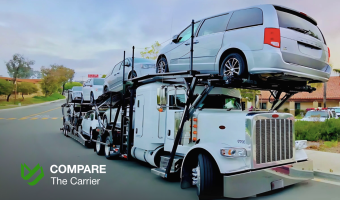For many Americans, cars are a necessity. Statista’s Global Consumer Survey reveals that 76% of Americans use their own car to travel from home to work, making it the most popular mode of transportation in the country. Though there are lots of alternatives out there, it seems that cars will remain the king of the road for many years to come.
Given the convenience of private car ownership, many people have their vehicles shipped across the country, especially when they’re moving to a new state. This can be quite a nerve-racking situation for many because accidents and damages can still happen 一 even if your carrier is careful with your car.
Luckily, this guide unveils four pivotal strategies to shield your car during its journey, ensuring peace of mind from departure to arrival. Protect your car with confidence, leveraging the essential auto transport safety tips curated by Compare The Carrier.
Purchase An Extended Warranty For Any Issues
If you plan to transport a newly purchased car to a different location, you might want to consider getting an extended auto warranty from your manufacturer, dealer, or any independent provider.
The Balance explains that extended warranties can cover repairs and replacements for certain car parts during a specific period or at a particular mileage. Service contracts usually only cover problems with electrical and mechanical parts, which is why it’s useful to purchase an extended version that can include more comprehensive services like tire replacements. These extended warranties can cost around $1000 or more upfront but can help maintain your car during and after the shipping process.
Invest In An Insurance Plan to Protect Your Car
Warranties are helpful, but their coverage can be pretty limited. To get more comprehensive protection for your car, you’ll need to invest in auto insurance.
Among all the types of auto insurance, Sound Dollar states that auto liability insurance is the one required by most states because it covers medical expenses and vehicle repairs in case of accidents. But if you’re going to transport your car, a comprehensive auto insurance plan can help protect your vehicle from theft, vandalism, fire, weather, or even impact damage.
A comprehensive insurance plan costs around $134 per month, but this can further decrease or increase depending on your vehicle’s value.
Use An Enclosed Trailer For Transportation
You can cover any possible damages to your vehicle through warranties and insurance. But if you don’t want to risk getting any damage to your car, it’s a good idea to transport it using an enclosed trailer.
Our article on the ‘Best Enclosed Auto Transport’ states that this option provides extra protection and safety for your vehicle because it shields your car from harsh weather conditions and road debris.
Enclosed auto transporters are also more experienced in handling high-end vehicles, so you’re ensured that your car is in good hands. This option charges about $2 per mile, but you get better peace of mind about your vehicle’s safety in return.
Moreover enclosed carriers keep an eye on their carrier insurance as they are used to shipping vehicles for hundreds of thousands of dollars. So in the case of most road accidents that can highly damage your vehicle, you’ll be covered by your carrier’s insurance. (to check the carrier’s insurance go to the FMCSA website)
But you should know that most carriers’ insurances are deductible. So small damages could be not covered by this insurance. And that’s why you should think about extra security for your car.
Immobilize Your Vehicle Through Security Systems
Enclosed auto transportation is already secure. However, you can go the extra mile by immobilizing your vehicle through security systems.
To prevent theft or misuse, an expert from Bournemouth University recommends using specific technologies that can track and immobilize your car. Remote Immobilizer Systems can be controlled wirelessly, so you can shut down or start the vehicle’s engine whenever you want. You can also invest in IoT applications or GPS so that you can capture data about your vehicle’s location and monitor it as it is being transported.
Anything can happen on the road. By taking the extra steps to protect your car, you can reduce the likelihood of damage and stay prepared for worst-case scenarios in car transport.
At Compare The Carrier, we believe in empowering our clients with the knowledge and tools necessary to ensure their vehicle’s safety across every mile. By adhering to these essential auto transport safety tips, you can significantly mitigate risks and enjoy a stress-free shipping experience. Remember, the safety of your car is paramount, and with the right strategies in place, you can navigate the transport process with confidence and peace of mind.
FAQ
What is auto transport and how does it work?
Auto transport, also known as car shipping or vehicle transport, is the process of moving vehicles from one location to another using specialized trailers. It can be done through open-air trailers or enclosed auto transport options, depending on the level of protection desired.
Why should I consider enclosed auto transport for my vehicle?
Enclosed auto transport offers superior protection for your vehicle against weather, road debris, and potential damages during transit. It’s especially recommended for high-value, luxury, or antique vehicles that require extra care and security.
What should I do to prepare my car for shipping?
Preparing your car for shipping involves cleaning the vehicle, documenting any existing damages, removing personal belongings, disabling alarms, and ensuring the tank is only a quarter full. This preparation helps streamline the transport process and protect your vehicle.
What factors affect the cost of auto transport?
The cost of auto transport can be influenced by several factors, including the distance of transport, the type of service (open vs. enclosed transport), the size and weight of the vehicle, and the time of year.
How long does auto transport usually take?
The duration of auto transport depends on the distance, route, and any unforeseen delays such as bad weather or traffic. On average, it can take anywhere from a few days to a couple of weeks. Choosing a reputable company like Compare The Carrier can ensure timely and safe delivery.


![Most Popular Methods Of Cross Country Car Shipping [2026 Update] 3 3 cross country auto transport](https://comparethecarrier.com/wp-content/uploads/2022/03/Most-Popular-Methods-Of-Cross-Country-Car-Shipping-340x200.jpg)














